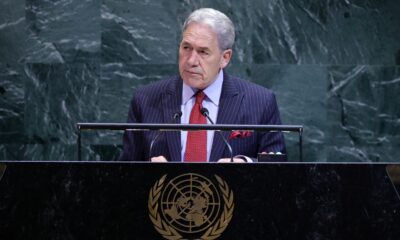Politics
Waitangi Tribunal Urges Citizenship Rights Expansion for Māori

The Waitangi Tribunal has called for an extension of citizenship rights for Māori, concluding that the current legislation violates the rights established under Te Tiriti o Waitangi. The tribunal’s findings highlight the issue of “citizenship by descent,” which currently applies exclusively to individuals born to New Zealand citizens. This limitation has raised concerns, particularly as more New Zealanders, including a significant number of Māori, establish families overseas.
The matter gained public attention in September 2023 when prominent actress Keisha Castle-Hughes voiced her concerns regarding the citizenship rights of her children, who were born outside New Zealand. She, along with others, pointed out that their status as children of New Zealand citizens does not grant them automatic citizenship if they are born abroad. This situation reflects a growing challenge for many families who reside in countries like Australia and wish to secure New Zealand citizenship for their offspring.
The tribunal’s inquiry was initiated by a claim from John Ruddock, who was born in Australia to a Māori mother from New Zealand. Ruddock shared experiences of navigating “demeaning” processes while trying to obtain citizenship for his three children, who were born in the United States. His testimony underscored the barriers faced by those seeking recognition of their citizenship rights under the current framework.
Despite the tribunal’s recommendations, significant changes to the Citizenship Act appear unlikely in the near future. Both the Minister of Internal Affairs and the Prime Minister have indicated that they do not plan to amend the existing legislation. This lack of action raises questions about the government’s commitment to addressing the disparities highlighted by the tribunal.
The growing number of Māori living abroad, particularly in Australia, has intensified discussions around citizenship rights and the implications for future generations. According to estimates, the number of Māori residing overseas has increased significantly in recent years, with many families expressing concerns about the long-term impact of their children’s citizenship status.
As the conversation continues, the Waitangi Tribunal’s findings may serve as a catalyst for further advocacy regarding the rights of Māori descendants born outside New Zealand. The outcomes of this inquiry reflect broader issues of identity, belonging, and the recognition of indigenous rights within the evolving landscape of New Zealand’s citizenship laws.
The tribunal’s recommendations emphasize the importance of revisiting existing policies to ensure they align with the foundational principles of Te Tiriti o Waitangi. As these discussions progress, the voices of those affected will be crucial in shaping the future of citizenship rights for Māori descendants living abroad.
-

 Sports2 months ago
Sports2 months agoNetball New Zealand Stands Down Dame Noeline Taurua for Series
-

 Entertainment2 months ago
Entertainment2 months agoTributes Pour In for Lachlan Rofe, Reality Star, Dead at 47
-

 Entertainment3 weeks ago
Entertainment3 weeks agoNew ‘Maverick’ Chaser Joins Beat the Chasers Season Finale
-

 Sports2 months ago
Sports2 months agoSilver Ferns Legend Laura Langman Criticizes Team’s Attitude
-

 Politics4 weeks ago
Politics4 weeks agoNetball NZ Calls for Respect Amid Dame Taurua’s Standoff
-

 Entertainment2 months ago
Entertainment2 months agoKhloe Kardashian Embraces Innovative Stem Cell Therapy in Mexico
-

 World3 months ago
World3 months agoPolice Arrest Multiple Individuals During Funeral for Zain Taikato-Fox
-

 Sports2 months ago
Sports2 months agoGaël Monfils Set to Defend ASB Classic Title in January 2026
-

 Entertainment1 month ago
Entertainment1 month agoTyson Fury’s Daughter Venezuela Gets Engaged at Birthday Bash
-

 Sports1 month ago
Sports1 month agoHeather McMahan Steps Down as Ryder Cup Host After Controversy
-

 World1 week ago
World1 week agoSevere Winds Hit New Zealand, Over 100 Flights Canceled
-

 Entertainment1 month ago
Entertainment1 month agoTyson Fury’s Daughter Venezuela Gets Engaged at Birthday Bash




















